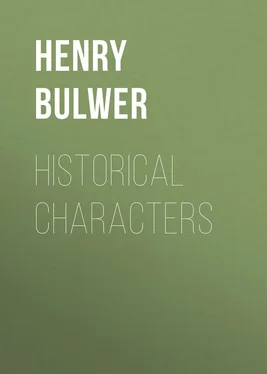Henry Bulwer - Historical Characters
Здесь есть возможность читать онлайн «Henry Bulwer - Historical Characters» — ознакомительный отрывок электронной книги совершенно бесплатно, а после прочтения отрывка купить полную версию. В некоторых случаях можно слушать аудио, скачать через торрент в формате fb2 и присутствует краткое содержание. Жанр: foreign_antique, foreign_prose, на английском языке. Описание произведения, (предисловие) а так же отзывы посетителей доступны на портале библиотеки ЛибКат.
- Название:Historical Characters
- Автор:
- Жанр:
- Год:неизвестен
- ISBN:нет данных
- Рейтинг книги:3 / 5. Голосов: 1
-
Избранное:Добавить в избранное
- Отзывы:
-
Ваша оценка:
- 60
- 1
- 2
- 3
- 4
- 5
Historical Characters: краткое содержание, описание и аннотация
Предлагаем к чтению аннотацию, описание, краткое содержание или предисловие (зависит от того, что написал сам автор книги «Historical Characters»). Если вы не нашли необходимую информацию о книге — напишите в комментариях, мы постараемся отыскать её.
Historical Characters — читать онлайн ознакомительный отрывок
Ниже представлен текст книги, разбитый по страницам. Система сохранения места последней прочитанной страницы, позволяет с удобством читать онлайн бесплатно книгу «Historical Characters», без необходимости каждый раз заново искать на чём Вы остановились. Поставьте закладку, и сможете в любой момент перейти на страницу, на которой закончили чтение.
Интервал:
Закладка:
I have narrated what had undoubtedly been Mirabeau’s projects; for we have to consider what were probably his thoughts when, in acute suffering but with an unclouded mind and a clear prescience of his approaching dissolution, he summoned his former friend, with whom, it is said, he was never till that instant completely reconciled, to the couch from which he was no more to rise.
Must we not suppose that Mirabeau in this, his last conversation with M. de Talleyrand, spoke of the schemes which then filled his mind? And does it not seem probable that he at that hour conceived the Bishop of Autun to be the person best fitted to fill the difficult position which he himself was about to leave vacant, and amidst the various intrigues and combinations of which it required so much skill to steer?
For this supposition there are many plausible reasons. M. de Talleyrand, like Mirabeau, was an aristocrat by birth, a liberal by circumstances and opinion; he was also one of the members of the Assembly, who possessed the greatest authority over that portion of it which Mirabeau himself influenced; and likewise one of a very small number of members upon whom M. de Montmorin, the minister with whom Louis XVI. at last consented that Mirabeau should confidentially communicate, had told Mirabeau he most relied. Lastly, he was acquainted with all the classes and almost all the individuals then seeking to disturb, or hoping to compose, the disordered elements of society. He knew the court, the clergy, the Orleanists. He had been one of the founders of the Jacobins; he was a member of its moderate rival, the Feuillans; and although, undoubtedly, he wanted the fire and eloquence necessary to command in great assemblies, he was pre-eminent in the tact and address which enable a man to manage those by whom such assemblies are led.
In short, though Mirabeau left no Mirabeau behind him, M. de Talleyrand was, perhaps, the person best qualified to supply his loss, and the one whom Mirabeau himself was most likely to have pointed out for a successor. I have no clue, however, beyond conjecture, to guide me on this subject, unless the public trust which Mirabeau confided to M. de Talleyrand in his last hours may be cited as a testimony of his other and more secret intentions. What this trust was, we may learn from the statement of M. de Talleyrand himself, who, on the following day, amidst a silence and a sorrow which pervaded all parties (for a man of superior genius, whatever his faults, rarely dies unlamented), ascending the tribune of the National Assembly, said in a voice which appeared unfeignedly affected:
“I went yesterday to the house of M. de Mirabeau. An immense crowd filled that mansion, to which I carried a sentiment more sorrowful than the public grief. The spectacle of woe before me filled the imagination with the image of death; it was everywhere but in the mind of him whom the most imminent danger menaced. He had asked to see me. It is needless to relate the emotion which many things he said caused me. But M. de Mirabeau was at that time above all things the man of the public; and in this respect we may regard as a precious relic the last words which could be saved from that mighty prey, on which death was about to seize. Concentrating all his interest on the labours that still remain to this Assembly, he remembered that the law of succession was the order of the day, and lamented he could not assist at the discussion of the question, regretting death, because it deprived him of the power of performing a public duty. But, as his opinion was committed to writing, he confided the manuscript to me, in order that I might in his name communicate it to you. I am going to execute this duty. The author of the manuscript is now no more; and so intimately were his wishes and thoughts connected with the public weal, that you may imagine yourselves catching his last breath, as you listen to the sentiments which I am about to read to you.”
Such were the words with which M. de Talleyrand prefaced the memorable discourse which, in establishing the principles on which the law of inheritance has since rested in France, laid the foundations of a new French society, on a basis which no circumstance that can now happen seems likely to alter.
“There is as much difference,” said Mirabeau, “between what a man does during his life, and what he does after his death, as between death and life. What is a testament? It is the expression of the will of a man who has no longer any will respecting property which is no longer his property; it is the action of a man no longer accountable for his actions to mankind; it is an absurdity, and an absurdity ought not to have the force of law.”
Such is the argument set forth in this celebrated and singular speech. Ingenious rather than profound, it does not seem, as we turn to it coolly now, worthy of the reputation it attained, nor of the effect which it has undoubtedly produced. But, read in M. de Talleyrand’s deep voice, and read as the last thoughts upon testamentary dispositions of a man who was making his own will when he composed it, and who since then was with his luminous intellect and marvellous eloquence about to be consigned to the obscure silence of the grave, it could hardly fail to make a deep impression. It was, moreover, the mantle of the departed prophet; and the world, whether wrong or right in the supposition, fancied that it saw in this political legacy the intention to designate a political successor.
Thus, M. de Talleyrand, already, as we have seen, a member of the department of Paris, was immediately chosen to fill the place in the directorship of that department, an appointment which Mirabeau’s death left vacant.
In this municipal council, considerable influence still existed; nor did it want various means for exercising that influence over the middle classes of the capital; so that a man of resolution and tact could have made it one of the most useful instruments for restoring the royal authority and consolidating it on new foundations.
It seems not unlikely, indeed, that M. de Talleyrand had the design of making it popular as the organ of good advice to the King, and of making the King popular by engaging him to listen to this advice, since we find that it drew up an address to him on the 18th April (about a fortnight after Mirabeau’s death), urging him to put aside from his councils those whom the nation distrusted, and to confide frankly in the men who were yet popular: whilst there is reason to believe, as I shall by-and-by have occasion to show, that M. de Talleyrand entered about this time into secret negotiations with the King, or, at least, offered him, through M. de Laporte, his best assistance.
But Louis XVI. was more likely to trust a bold and passionate man like Mirabeau, whom, notwithstanding his birth, he looked upon – considering the situation in which the Revolution had found him – as an adventurer who had been almost naturally his opponent, until he had purchased his support, rather than a man like M. de Talleyrand; a philosopher, a wit, who might be said to have been bred a courtier; and, on the other hand, M. de Talleyrand himself was too cautious to commit himself boldly and entirely to the daring and doubtful schemes which Mirabeau had prepared, until he saw a tolerable chance of their being successful.
Other circumstances, moreover, occurred at this time, which could not but have an unfavourable influence as to the establishment of any serious concert between the scrupulous and mistrustful monarch, and the chess-playing, constitutional bishop.
When M. de Talleyrand rejected the archbishopric of Paris, it was clear that he expected nothing further from the church; and he no doubt from that moment conceived the idea of freeing himself from its trammels on the first decent opportunity: nor did he long wait for this opportunity, for, on the 26th of April, one day after his consecration of the Curé Expelles, the newly-elected Bishop of Finisterre, arrived a brief thus announced in the Moniteur of the 1st of May, 1791:
Читать дальшеИнтервал:
Закладка:
Похожие книги на «Historical Characters»
Представляем Вашему вниманию похожие книги на «Historical Characters» списком для выбора. Мы отобрали схожую по названию и смыслу литературу в надежде предоставить читателям больше вариантов отыскать новые, интересные, ещё непрочитанные произведения.
Обсуждение, отзывы о книге «Historical Characters» и просто собственные мнения читателей. Оставьте ваши комментарии, напишите, что Вы думаете о произведении, его смысле или главных героях. Укажите что конкретно понравилось, а что нет, и почему Вы так считаете.












